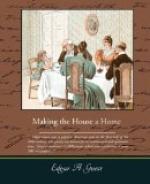“It’s a Boy!” All that day and the next I fairly shouted it to friends and strangers. To Marjorie’s sweetness, and to the radiant loveliness of the little baby which was ours for so brief a time, had been added the strength and roguishness of a boy.
The next five years saw the walls of our home change in character. Finger marks and hammer marks began to appear. When Bud had reached the stage where he could walk, calamity began to follow in his trail. Once he tugged at a table cover and the open bottle of ink fell upon the rug. There was a great splotch of ink forever to be visible to all who entered that living-room! Yet even that black stain became in time a part of us. We grew even to boast of it. We pointed it out to new acquaintances as the place where Bud spilled the ink. It was an evidence of his health and his natural tendencies. It proved to all the world that in Bud we had a real boy; an honest-to-goodness boy who could spill ink—and would, if you didn’t keep a close watch on him.
Then came the toy period of our development. The once tidy house became a place where angels would have feared to tread in the dark. Building blocks and trains of cars and fire engines and a rocking horse were everywhere, to trip the feet of the unwary. Mother scolded about it, at times; and I fear I myself have muttered harsh things when, late at night, I have entered the house only to stumble against the tin sides of an express wagon.
But I have come to see that toys in a house are its real adornments. There is no pleasanter sight within the front door of any man’s castle than the strewn and disordered evidences that children there abide. The house seems unfurnished without them.
This chaos still exists in our house to-day. Mother says I encourage it. Perhaps I do. I know that I dread the coming day when the home shall become neat and orderly and silent and precise. What is more, I live in horror of the day when I shall have to sit down to a meal and not send a certain little fellow away from the table to wash his hands. That has become a part of the ceremonial of my life. When the evening comes that he will appear for dinner, clean and immaculate, his shirt buttoned properly and his hair nicely brushed, perhaps Mother will be proud of him; but as for me, there will be a lump in my throat—for I shall know that he has grown up.
Financially, we were progressing. We had a little more “to do with,” as Mother expressed it; but sorrow and grief and anxiety were not through with us.
We were not to be one hundred per cent happy. No one ever is. Marjorie was stricken with typhoid fever, and for fourteen weeks we fought that battle; saw her sink almost into the very arms of death; and watched her pale and wasted body day by day, until at last the fever broke and she was spared to us.
Another bedroom assumed a new meaning to us both. We knew it as it was in the dark hours of night; we saw the morning sun break through its windows. It was the first room I visited in the morning and the last I went to every night. Coming home, I never stopped in hall or living-room, but hurried straight to her. All there was in that home then was Marjorie’s room! We lived our lives within it. And gradually, her strength returned and we were happy again.




